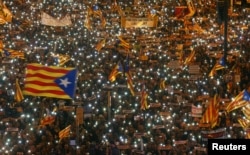Madrid believes Russian-based groups used online social media to heavily promote Catalonia's independence referendum last month in an attempt to destabilize Spain, Spanish ministers said Monday.
Spain's defense and foreign ministers said they had evidence that state and private-sector Russian groups, as well as groups in Venezuela, used Twitter, Facebook and other Internet sites to massively publicize the separatist cause and swing public opinion behind it in the run-up to the Oct. 1 referendum.
Catalonia's separatist leaders have denied that Russian interference helped them in the vote.
"What we know today is that much of this came from Russian territory," Spanish Defense Minister Maria Dolores de Cospedal said of Russian-based internet support.
"These are groups that, public and private, are trying to influence the situation and create instability in Europe," she told reporters at a meeting of EU foreign and defense ministers in Brussels.
Asked if Madrid was certain of the accusations, Spanish Foreign Minister Alfonso Dastis, also at the meeting, said: "Yes, we have proof."
Dastis said Spain had detected false accounts on social media, half of which were traced back to Russia and another 30 percent to Venezuela, created to amplify the benefits of the separatist cause by re-publishing messages and posts.
Ramon Tremosa, the EU lawmaker for the PDeCat party of Catalan separatist leader Carles Puigdemont, repeated on Monday that Russian interference had played no part in the referendum.
"Those that say Russia is helping Catalonia are those that have helped the Russian fleet in recent years, despite the EU's boycott," Tremosa tweeted, referring to Spanish media reports that Spain was allowing Russian warships to refuel at its ports.
Those who voted in the referendum opted overwhelmingly for independence. But turnout was only about 43 percent as Catalans who favor remaining part of Spain mainly boycotted the ballot.
The separatist vote has plunged Spain, the eurozone's fourth-biggest economy, into its worst constitutional crisis since its return to democracy in the 1970s.
Dastis said he had raised the issue with the Kremlin.
Moscow has repeatedly denied any such interference and accuses the West of a campaign to discredit Russia.
Information warfare?
NATO believes Moscow is involved in a deliberately ambiguous strategy of information warfare and disinformation to try to divide the West and break its unity over economic sanctions imposed on Russia following its 2014 annexation of Crimea.
U.S. intelligence agencies concluded in January that Russia interfered in the U.S. election to try to help President Donald Trump defeat rival Hillary Clinton by hacking and releasing emails and spreading propaganda via social media.
NATO Secretary-General Jens Stoltenberg, who attended the EU meeting in Brussels, declined to comment on Spain's accusations, but the alliance's top commander said last week that Russian interference was a concern.
NATO's Supreme Allied Commander General Curtis Scaparotti said "Russian malign influence" was trying to sway elections and other decisions in the West, describing it as a "destabilization campaign," although he did not directly address the Catalonia referendum.






